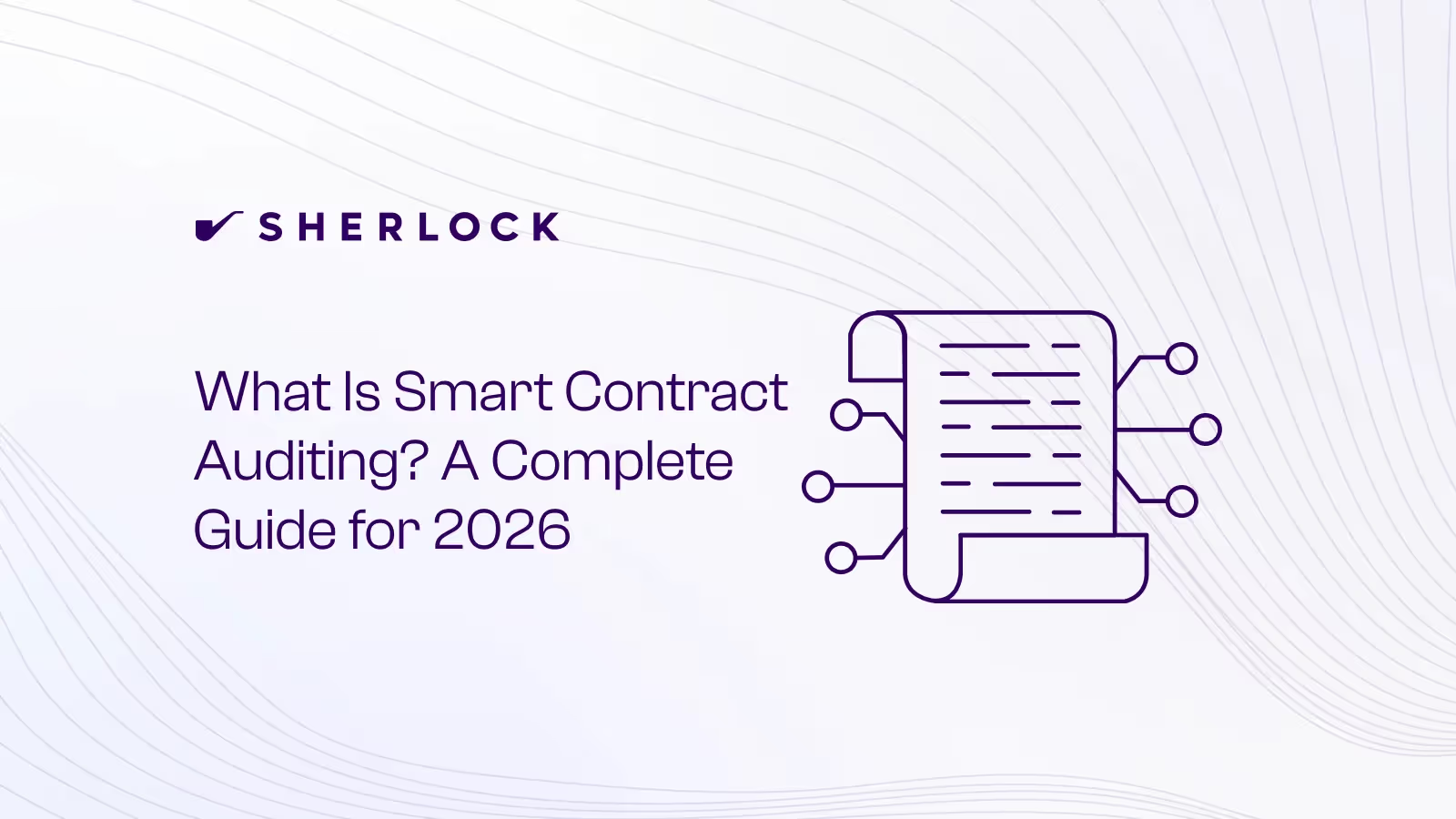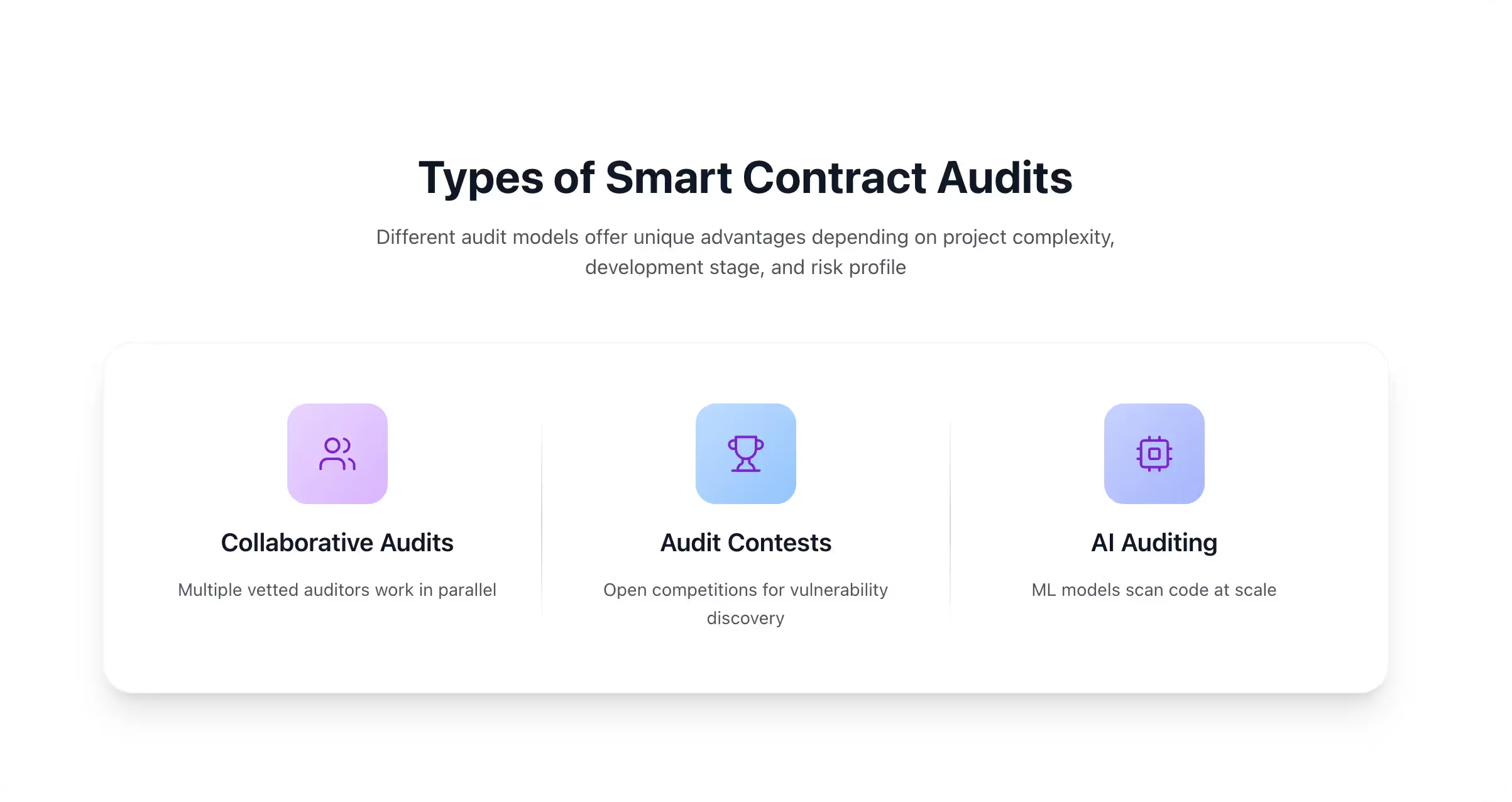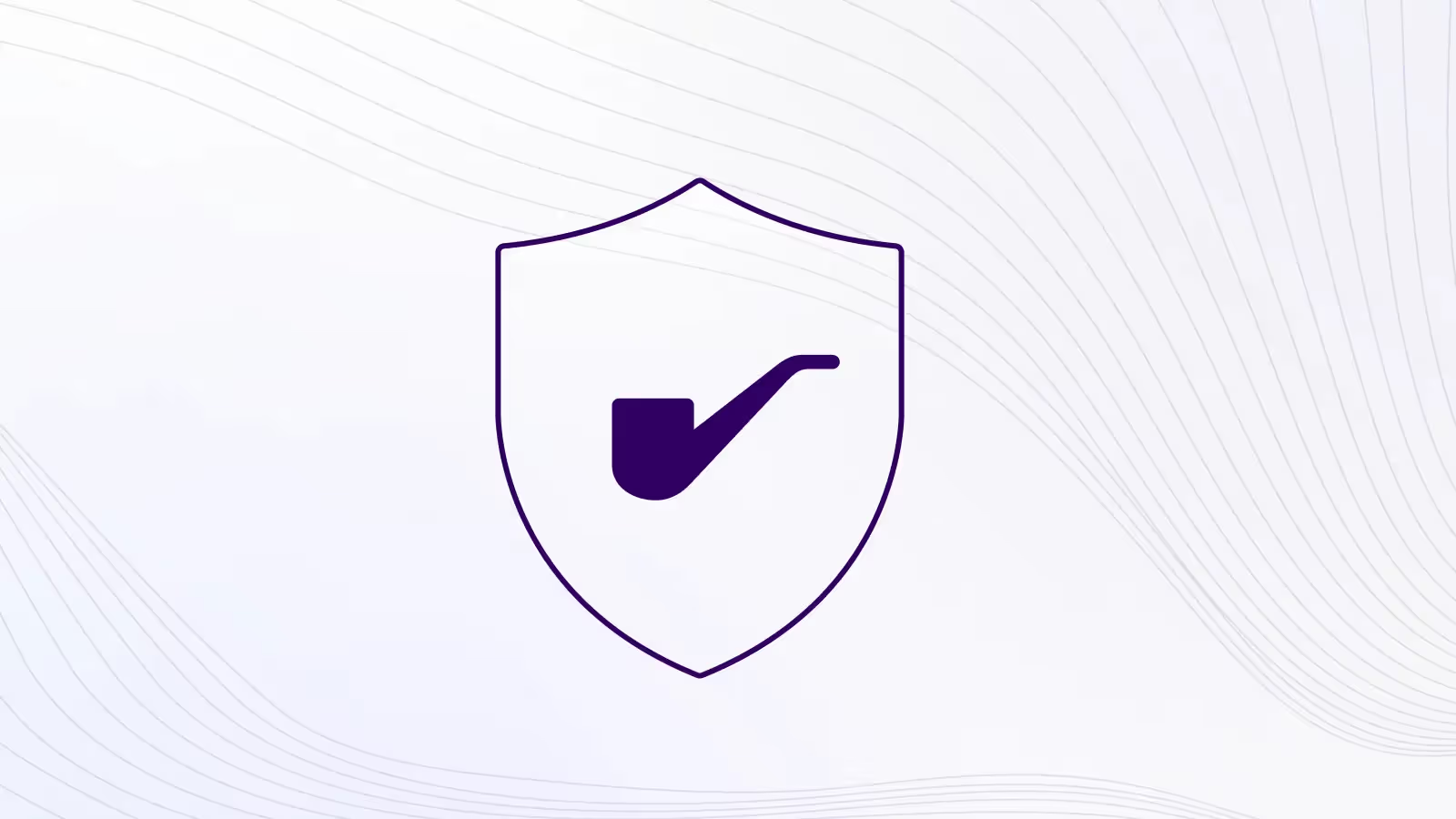What Is Smart Contract Auditing? A Complete Guide for 2026
Learn what smart contract auditing is, how it works, and why it’s essential for Web3 security in 2026. Explore process, tools, and best practices.

Smart contract auditing is the process of reviewing blockchain-based code to identify vulnerabilities, logic errors, and security risks before deployment. It ensures that the contract’s behavior aligns with its intended design and that assets governed by the code remain secure once live on-chain.
What Is Smart Contract Auditing? A Complete Guide for 2026
Securing smart contract code before it goes live is one of the most critical steps in building a trustworthy Web3 application. Once deployed, smart contracts are immutable - meaning any flaw can instantly put user funds, protocol logic, and brand reputation at risk. That’s why smart contract auditing has become a foundational practice for Web3 teams.
An audit involves a structured, in-depth analysis of code to uncover vulnerabilities, design flaws, and potential exploits before they reach production. As decentralized systems scale and evolve, auditing in 2026 has shifted from static, one-time reviews to continuous, data-driven security programs that combine automation, AI, and human expertise. This guide explains what smart contract auditing is, how it works, and why it remains central to protecting value in the modern blockchain ecosystem.
The Role of Auditing in Building Trust and Preventing Loss
Smart contract audits exist to validate the integrity of code before it holds or transfers real value. In Web3, every contract deployed to the blockchain becomes public and immutable, meaning any vulnerability can be exploited instantly and at scale. An audit provides an independent assessment of that code, identifying logic errors, permission flaws, and attack surfaces that might not be visible during development. For teams, it’s the difference between launching with confidence and exposing users to financial risk.
Audits also signal credibility. In an ecosystem built on open-source code and trustless systems, external verification has become a prerequisite for funding, integrations, and user adoption. Investors, partners, and communities often view an audit report as proof of operational maturity: evidence that a project takes security seriously. The best teams go beyond a single pre-launch review, embedding continuous security checks throughout development to catch vulnerabilities early, reduce technical debt, and safeguard every stage of their protocol’s lifecycle.
Types of Smart Contract Audits
Not all audits follow the same process or structure. As Web3 security has matured, different models have emerged to balance speed, depth, and scalability. Each approach offers unique advantages depending on a project’s complexity, development stage, and risk profile. Below are the three most common audit types shaping security in 2026.

Collaborative Audits
Collaborative audits combine the precision of professional review with the reach of a larger research network. Instead of relying on a single firm, multiple vetted auditors work together in parallel on the same codebase, sharing insights and cross-checking findings in real time. This model expands coverage, exposes more attack vectors, and captures edge cases that isolated reviews might miss. Teams often prefer collaborative audits when preparing for major launches or protocol upgrades, where the risk tolerance is near zero and multiple expert opinions are worth the coordination overhead.
Audit Contests
Audit contests are structured as open, time-boxed reviews where security researchers compete to uncover vulnerabilities for rewards. This model scales review breadth across dozens or hundreds of participants, producing diverse findings that span everything from minor inefficiencies to critical exploits. Submissions are later triaged, validated, and consolidated into a final report. Contests are particularly effective for large or complex codebases, where many eyes can collectively surface issues faster than a small, fixed team. The trade-off is that they require strong judging and triage to distinguish duplicates and prioritize real impact.
AI Auditing
AI-assisted auditing is the newest layer of the process, designed to complement human researchers rather than replace them. Machine learning models trained on historical findings, exploit data, and audit reports can scan code for patterns, anomalies, and potential vulnerabilities at scale. These systems help teams catch recurring logic flaws early in development and guide human auditors toward the highest-risk areas. While AI auditing accelerates detection and improves consistency, expert validation remains essential — the most effective programs use AI for signal generation and humans for judgment.
How Much Does a Smart Contract Audit Cost?
The cost of a smart contract audit depends on several factors that go beyond project size. Smaller contracts with straightforward logic may cost $10,000–$25,000, while complex protocols with advanced mechanics, cross-chain components, or large codebases can exceed $100,000–$250,000. The final price reflects the amount of time, expertise, and assurance required to properly evaluate the code’s safety.
Five key variables typically drive audit pricing:
- Complexity: intricate math, multiple integrations, or novel architectures require deeper analysis and specialized reviewers.
- Code volume: larger or modular systems take longer to review and validate across dependencies.
- Timeline: shorter turnaround windows demand additional resources and coordination.
- Scope & depth: formal verification, post-fix re-audits, or multiple review phases increase workload.
- Engagement model: firm-led audits, collaborative audits, and contests each have different cost structures and payout mechanisms.
In 2026, most teams treat auditing as an ongoing investment rather than a one-time cost. Continuous development cycles, protocol upgrades, and dependency updates mean security reviews happen regularly to maintain the same level of assurance over time.
The Future of Smart Contract Auditing
Smart contract auditing is evolving from a static checkpoint into a continuous security discipline. As protocols become more modular and interconnected, audits now extend far beyond pre-launch reviews. Teams are beginning to pair human expertise with automated analysis, AI-driven detection, and live monitoring to maintain protection throughout a protocol’s lifecycle. This shift reflects a broader realization across the industry - security is now being seen as ongoing process that scales with the complexity of the systems being built.
By 2026, the most secure teams are those adopting lifecycle security approaches. They integrate automated scanners and AI auditing during development, run collaborative or contest-based audits before deployment, and rely on bug bounties, runtime monitoring, and coverage after launch. This layered model provides continuous visibility into potential weaknesses as code, dependencies, and market conditions evolve.
Final Thoughts
Smart contract auditing has evolved from a safety measure into a cornerstone of how Web3 operates. The protocols that thrive are the ones that approach security as an ongoing discipline: testing, refining, and validating at every stage of development. As automation and AI expand what’s possible, the core purpose stays the same: making sure trust in code is earned, not assumed.
If your next deployment deserves the same level of assurance, Sherlock combines collaborative auditing, AI analysis, and continuous protection to keep your contracts secure from build to live operations.
Frequently Asked Questions
How long does a smart contract audit take?
Most audits take 2–6 weeks depending on code complexity, number of contracts, and required depth of review.
Who performs smart contract audits?
Audits are performed by specialized security firms and independent researchers experienced in blockchain development and vulnerability discovery.
How much does a smart contract audit cost?
Typical audits range from $10,000 to $250,000, depending on project scope, complexity, and methodology.
Is AI used in smart contract auditing?
Yes. AI-assisted auditing tools now help identify vulnerabilities faster and support researchers by highlighting high-risk patterns in code.
What makes a smart contract audit successful?
A successful audit verifies that all critical vulnerabilities are fixed, key invariants hold, and the protocol can operate safely under real-world conditions. It also produces clear, reproducible findings that help the development team strengthen their security practices long after the report is delivered.


